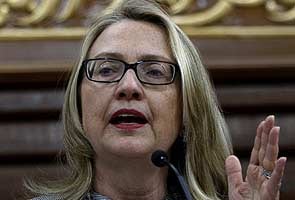
Washington:
As India and the United States pledge to deepen their co-operation in the field of education through a slew of innovative measures, US Secretary of State Hillary Clinton has cautioned against "bogus" education.
"I think we have to be very thoughtful about how to make the most of these efforts, because, to be very frank, some of what passes for distance learning and computerised instructions is really bogus," Ms Clinton said in her address to the opening session of India-US Higher Education Dialogue.
"It doesn't add up. It doesn't make a difference. Some of it is brilliant and effective. How do we begin separating the wheat from the chaff? How do we have standards that move us in the right direction and don't leave open a broad field for the exploitation of students because we don't have the right standards and expectations in place?" she asked.
Ms Clinton was referring to the online availability of teaching materials and long-distance education.
Addressing educationist and officials from both countries, Ms Clinton hoped that they would discuss ways to make the world's best teaching materials available to everyone, no matter where they live or how much money they have.
Referring to the talked about cloud computing by her Indian counterpart, Ms Clinton stressed on the need to use modern technology in order to bring to the doorstep or to the screen of students who would otherwise not have the opportunity.
"All that is available today. And this new technology makes it possible to revolutionise higher education, even in some of the world's poorest places," she said.
"The United States is investing nearly US $ two billion in the creation of open educational resources, and India has also made impressive progress on its own," Ms Clinton said.
"If our students are going to solve global challenges, they need to understand those global challenges. Now, US institutions in particular are seeking to broaden their curricula and provide more opportunities for their students and scholars to gain international experience," she said.
"Thanks to support from both governments, we're exchanging more students and scholars through the Fulbright-Nehru program than ever before. Today, I hope you'll explore ways to increase partnerships in fields like food and water security, climate change, sustainable energy, and public health. These are areas that are ripe for new ideas," Ms Clinton said.
"I think we have to be very thoughtful about how to make the most of these efforts, because, to be very frank, some of what passes for distance learning and computerised instructions is really bogus," Ms Clinton said in her address to the opening session of India-US Higher Education Dialogue.
"It doesn't add up. It doesn't make a difference. Some of it is brilliant and effective. How do we begin separating the wheat from the chaff? How do we have standards that move us in the right direction and don't leave open a broad field for the exploitation of students because we don't have the right standards and expectations in place?" she asked.
Ms Clinton was referring to the online availability of teaching materials and long-distance education.
Addressing educationist and officials from both countries, Ms Clinton hoped that they would discuss ways to make the world's best teaching materials available to everyone, no matter where they live or how much money they have.
Referring to the talked about cloud computing by her Indian counterpart, Ms Clinton stressed on the need to use modern technology in order to bring to the doorstep or to the screen of students who would otherwise not have the opportunity.
"All that is available today. And this new technology makes it possible to revolutionise higher education, even in some of the world's poorest places," she said.
"The United States is investing nearly US $ two billion in the creation of open educational resources, and India has also made impressive progress on its own," Ms Clinton said.
"If our students are going to solve global challenges, they need to understand those global challenges. Now, US institutions in particular are seeking to broaden their curricula and provide more opportunities for their students and scholars to gain international experience," she said.
"Thanks to support from both governments, we're exchanging more students and scholars through the Fulbright-Nehru program than ever before. Today, I hope you'll explore ways to increase partnerships in fields like food and water security, climate change, sustainable energy, and public health. These are areas that are ripe for new ideas," Ms Clinton said.
Track Latest News Live on NDTV.com and get news updates from India and around the world

